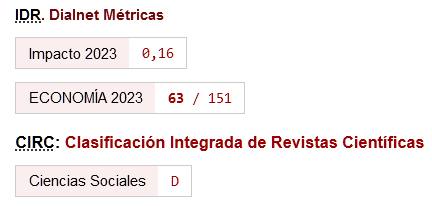El futuro dialéctico del decrecimiento.
¿Ficción distópica o proyecto emancipador?
Palabras clave:
decrecimiento, utopía dialéctica, Cooperativa Integral Catalana, alternativas económicas, límites, escasezResumen
En los últimos años han emergido con fuerza alternativas socio-económicas, políticas y ambientales que quieren subvertir los lenguajes y los relatos hegemónicos que nos guían a la crisis permanente. Este es el caso del decrecimiento, un proyecto de transformación político-económica y socio-ecológica que busca “descolonizar” el imaginario social basado en el crecimiento infinito. En este trabajo, realizamos una reflexión crítica sobre las principales ideas y propuestas del decrecimiento a través de la ficción literaria de Ursula Le Guin Los Desposeídos, una ambigua utopía comunitaria de frugalidad y renuncia material. Utilizamos el caso de la Cooperativa Integral Catalana y sus múltiples iniciativas como referente real de las ideas examinadas. Argumentamos que el decrecimiento puede ser entendido como una "utopía dialéctica" que es espacio-temporal, que mantiene una tensión entre los procesos de apertura y cierre y que es eminentemente subversiva, cuestionando nociones profundamente enraizadas como la de “escasez”. Si bien el decrecimiento puede tener sus problemas teóricos y prácticos, argumentamos que puede realizar una importante contribución al pensamiento económico crítico.
Descargas
Citas
Ariès, Paul (2005): "Decroissance ou Barbarie", Lyon: Golias.
Asara, Viviana, Profumi, Emanuele y Kallis, Giorgos (2013): "Degrowth, Democracy and Autonomy", [Environmental Values Vol. 22, pp. 217-239](https://doi.org/10.3197/096327113X13581561725239).
Carlson, Sheryle (2012): "Degrowth in action: from opposition to alternatives building. How the Cooperativa Integral Catalana enacts a degrowth vision", Tesis de Master sin publicar, Lund: University of Lund.
Castoriadis, Cornelius (2005): Une société à la dérive, Paris: Ed. Seuil.
Cattaneo, Claudio, D'Alisa, Giacomo, Kallis, Giorgos y Zografos, Christos (2012): Degrowth futures and democracy, [Futures Vol. 44 Nº6, pp. 515-523](https://doi.org/10.1016/j.futures.2012.03.019).
Chomsky, Noam (2014): The Greening of Noam Chomsky: a conversation. [Canadian Dimesion](http://canadiandimension.com/articles/5874/).
Costa, Didac (2013): Conversación con los autores 30 de mayo de 2013, Barcelona.
D'Alisa, Giacomo, Demaria, Federico y Kallis, Giorgos (editores) (2014): Degrowth: A Vocabulary for a New Era, New York: Routledge.
Davis, Laurence (2005): "The dynamic and revolutionary utopia of Ursula K. Le Guin" en Laurence Davis y Peter Stillman (eds.) The new utopian politics of Ursula K. Le Guin's The Dispossessed, Oxford: Lexington Books, pp. 3-36.
Demaria, Federico, Schneider, François, Sekulova, Filka y Martínez-Alier, Joan (2013): What is Degrowth? From an activist slogan to a social movement, [Environmental Values Vol. 22 Nº 2, pp. 191-215](https://doi.org/10.3197/096327113X13581561725194).
Ellul, Jacques. (1980): The technological system, New York: Continuum Publishing.
Fernández Buey, Francisco Javier (2007): ¿Es el decrecimiento una utopía realizable?, Papeles de relaciones ecosociales y cambio global Nº 100, pp. 53-61.
Ferns, Chris (2005): "Future conditional or future perfect? The Dispossessed and permanent revolution" en Laurence Davis y Peter Stillman (eds.) The new utopian politics of Ursula K. Le Guin's The Dispossessed, Oxford: Lexington Books, pp. 249-264.
Georgescu-Roegen, Nicholas (1971): The Entropy Law and the Economic Process, Cambridge: Harvard University Press, [https://doi.org/10.4159/harvard.9780674281653](https://doi.org/10.4159/harvard.9780674281653).
Gorz, André (1994): Capitalism, Socialism, Ecology, London: Verso.
Gorz, André (M. Bosquet) (1972): Nouvel Observateur, París, Nº 397, 19 Junio. Actas de un debate público organizado en París por el Club du Nouvel Observateur.
Gorz, André (1980): Farewell to the Working Class: An Essay on Post-Industrial Socialism, London: Pluto Press.
Grinevald, Jaques y Rens, Ivo (1979): Demain la décroissance: entropie-écologie-économie, Lausanne: Pierre-Marcel Favre.
Graeber, David (2004): Fragments of an anarchist anthropology, Chicago: Prickly Press.
Harvey, David (2000): Spaces of Hope, Berkeley: University of California Press.
Iglesias Fernández, José (2009): Consumo y crecimiento, no. Capitalismo, tampoco. Manifiestos contra el decrecimiento y el consumo responsable. Disponible en: [http://rentabasica.net/otras_obras/decrecimiento/Sobre_el_decrecimiento_y_otras_rendiciones_parte_1.pdf](http://rentabasica.net/otras_obras/decrecimiento/Sobre_el_decrecimiento_y_otras_rendiciones_parte_1.pdf)
Iglesias Fernández, José (2011a): La Miseria del Decrecimiento. De cómo salvar el planeta con el capitalismo dentro, Barcelona: Libreando, Baladre.
Iglesias Fernández, José (2011b): Entrevista a José Iglesias Fernández sobre el Decrecimiento, por Federico Faccio Peláez, Barcelona: El Viejo Topo.
Illich, Ivan (1973): Tools for conviviality, London: Calder and Boyars.
Jameson, Fredric (1975): World-reduction in Le Guin. The emergence of utopian narrative, Science Fiction Studies Vol. 2 Nº 3, #7.
Kallis, Giorgos y March, Hug (2014): Imaginaries of Hope: The Utopianism of Degrowth, Annals of the American Association of Geographers Vol. 105 Nº 2, pp. 360-368, [https://doi.org/10.1080/00045608.2014.973803](https://doi.org/10.1080/00045608.2014.973803).
Latouche, Serge (2009): Farewell to Growth, Cambridge: Polity Press.
Latouche, Serge (2012): La sociedad de la abundancia frugal, Barcelona: Icaria.
Le Guin, Ursula (1974): The Dispossessed, New York: Avon Books.
Le Guin, Ursula (1982): A Non-Euclidean View of California as a Cold Place to Be, Conferencia en la University of California, San Diego.
Le Guin, Ursula (1989): Dancing at the Edge of the World: Thoughts on Words, Women, Places, New York: Grove Press.
Masjuan, Eduard (2000): La ecología humana en el anarquismo ibérico, Barcelona: Icaria Editorial.
Navarro, Vicenç (2013): Ivan Illich, Serge Latouche, el decrecimiento y el movimiento ecologista, Público.es, 3 Octubre de 2013.
Pinder, David (2002): In defence of utopian urbanism: imagining cities after the 'end of utopia', [Geografiska Annaler Vol. 84 B Nº 3-4, pp. 229-241](https://doi.org/10.1111/1468-0467.00126).
Reynolds, Andrew (2005): Ursula K. Le Guin, Herbert Marcuse and the fate of utopia in the post-modern. En The new utopian politics of Ursula K. Le Guin's The Dispossessed. Davis L. y P. Stillman (eds), 75-94, Oxford: Lexington Books.
Rodgers, J. (2005): "Fulfillment as a function of time, or the ambiguous process of utopia" en Laurence Davis y Peter Stillman (eds.) The new utopian politics of Ursula K. Le Guin's The Dispossessed, Oxford: Lexington Books, pp. 181-194.
Romano, Onofrio (2012): How to rebuild democracy, re-thinking degrowth, Futures 44 (6): 582-589, [https://doi.org/10.1016/j.futures.2012.03.019](https://doi.org/10.1016/j.futures.2012.03.019).
Sahlins, Marshall (1972): Stone Age Economics, Chicago: Aldine.
Schneider, François, Kallis Giorgos y Martínez-Alier, Joan (2010): Crisis or opportunity? Economic degrowth for social equity and ecological sustainability. Introduction to this special issue, Journal of Cleaner Production Vol. 18 Nº 6, pp. 511-518.
Skidelsky, Robert y Skidelsky, Edward (2012): How much is enough? Money and the good life, London: Penguin.
Somay, Bülent (2005): "From ambiguity to self-reflexivity: revolutionizing fantasy space" en Laurence Davis y Peter Stillman (eds.) The new utopian politics of Ursula K. Le Guin's The Dispossessed, Oxford: Lexington Books, pp. 223-248.
Stillman, Peter (2005): "The Dispossessed as ecological political theory" en Laurence Davis y Peter Stillman (eds.) The new utopian politics of Ursula K. Le Guin's The Dispossessed, Oxford: Lexington Books, pp. 55-76.
Swyngedouw, Erik (2010): Apocalypse Forever? Post-political Populism and the Spectre of Climate Change, Theory, Culture and Society Vol. 27 Nº 2-3, pp. 213-232.
Descargas
Publicado
Cómo citar
Número
Sección
Licencia
Esta licencia permite a terceros compartir (copiar y redistribuir el material en cualquier medio o formato) y adaptar (remezclar, transformar y crear a partir del material para cualquier finalidad, incluso comercial), siempre que se reconozca la autoría y la primera publicación en esta revista (La Revista, DOI de la obra), se proporcione un enlace a la licencia y se indique si se han realizado cambios en la obra.







